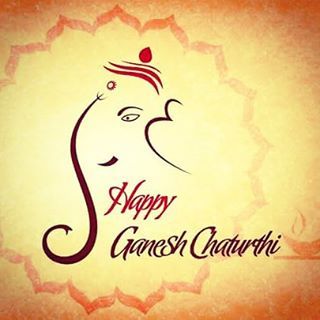GANESH CHATURTHI
Edit: This is in addition to my previous year's blog post.
This year Ganesh Chaturthi falls on the 22nd of August. Specially in this period of COVID-19 pandemic, we should not indulge in large gatherings outside for Ganesh Puja.
Wishing you all a happy Ganesh Chaturthi, 2020.
 |
| HAPPY VINAYAK CHATURTHI |

 |
| HAPPY GANESH CHATURTHI |
It's also known as Vinayak Chaturthi. Because, Vinayak is the other name for Ganesh.
Ganesh Chaturthi is celebrated as the birthday of Lord Ganesh, who's considered by Hindus as God of wisdom and success. Lord Ganesha is the son of Shiva and Parvati.

He's also called Vighnaharta or Vignavinashak, meaning remover of all obstacles. Though the festival is celebrated all over India. But, specially, in the state of Maharashtra, it is fervently celebrated and with exceptional zeal. It can last up to ten days. People celebrate the birth of Lord Ganesh both as a private affair in houses as well as public affair in community places. Large pandals are erected and clay idols are installed inside. The clay idols are decorated with garlands and the whole area is decorated nicely. A Brahmin priest conducts all the rituals related to Puja. Slokas are chanted. People make offerings and perform worship.
Lord Ganesha is the God of good omen and his consent is mandatory for starting any thing new, whether in business or life.
He's considered as remover of all the problems and creator of happiness in the life of people. People in India always seek the blessings of Ganesha before starting any new work. He's the lovely God for all children. Children call him Chhota Ganesh or friend Ganesh,as He cares and loves children.
 |
| HAPPY GANESH PUJA |
 |
| OM GANESHAYA NAMAH |














Comments
Post a Comment